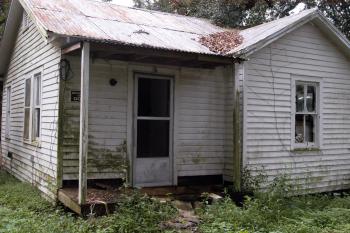
Murder trial jury selected
Thu, 2013-10-17 14:24
Harlan Kirgan
Franklin, La.
By PRESTON GILL
A jury of nine women and three men will decide the fate of 18-year-old JaMichael Leshawn Hudson, who is accused of murdering two people in a home robbery on Feb. 3, 2010, as the trial resumed this morning before 16th Judicial District Judge James R. McClelland.
Assistant District Attorney Anthony Saleme wasted no time Wednesday after jurors were selected in showing graphic photographs of the victims.
Larry Guillory, 49, lay to the left of the front door, in a pool of blood with his head gashed open to the skull in at least two places.
When a slide showed Audrey Picard, 75, her face was so brutally smashed that none of her features could be seen, a juror winced and brought her hand to her own face where it stayed over her mouth for several seconds.
Hudson, dressed in a white shirt with pink stripes and blue jeans, viewed the pictures on the screen; occasionally pursing his lips but showing no emotion.
About half a dozen of his family and friends sat halfway back in the nearly empty courtroom. There was no one in the courtroom linked to the victims.
Hudson, not quite 16 at the time of the murders, was indicted with Randy Joseph, on March 2, 2010, on two first-degree murder charges in the death of the pair who shared the home at 6 Darce Lane in Franklin.
Later that month, McClelland ordered Hudson tried as an adult. If Hudson is found guilty, the state cannot seek the death penalty because the U.S. Supreme Court ruled defendants who commit a crime before the age of 18 cannot be executed.
Joseph, the nephew of Guillory, was sentenced to life without possibility of parole after pleading guilty in January 2012. He could not be given the death penalty because a mental evaluation reported him with an IQ of 69. The U.S. Supreme Court has ruled the execution of mentally disabled persons is unconstitutional.
Baton Rouge defense attorney Edward Moses Jr. said in his opening statement the “evidence will show a completely different individual committed the crime,” an apparent reference to Joseph.
“This one particular individual was found with the decedents’ ... property and it wasn’t my client,” he said referring to Hudson.
He said while that individual was in custody, again evidently referring to Joseph, he gave three conflicting statements about what occurred and who was involved.
Saleme started the trial saying the state will prove Hudson was at the scene of the crime and was a part of a home invasion for the purpose of robbing the couple. He defined first and second degree murder. He said the definitions are significant because after the trial the only question the jurors could have will be if Hudson went there with an intent to kill or not, which is the primary distinction between the charges.
Saleme called eight witnesses that were either police investigators or private citizens offering testimony of a disturbance at the Darce Lane residence on the night of Feb. 3, 2010.
Aimee Guidroz, an officer with the Franklin Police Department at the time, opened evidence packages with two flashlights she had retrieved near the bodies.
She said police thought the flashlights might be significant because the electrical breaker box had been tripped and the electricity was cut off.
She conceded to Moses that police did not know when the breaker box had been tripped, or what the flashlights had been used for.
Brenda Dantin, living nearby, said she heard a loud banging noise that night as she talked on the phone and went to the window of her mobile home and saw what she thought was someone near the house and another person on the corner of the porch. She said she could not tell the sex or race of the persons.
She thought the power was out in the house because there were no lights on but a flashlight was shining in the house.
Moses asked Dantin why that would not seem odd to her and she replied that the electricity always goes off.
Penny Lege, who was talking on the phone with Dantin, said under cross examination by Moses, she could only recall Dantin speaking about one male on the front porch of the Darce Lane residence while they talked on the phone.
Jimmy Broussard said he assisted in collecting evidence at the small house as a deputy with the St. Mary Sheriff’s Office. He said he removed a pulled-out coverall pocket that Guillory was wearing.
“We thought some suspect went into his pants pocket,” Broussard said.
Lance St. Blanc said he was assigned by the sheriff to assist in the investigation. The Acadiana Crime Lab investigators closed the house and filled it with a chemical smoke that would reveal residual blood in the form of black spots, he said. Bloody shoeprints were detected throughout the house, he said. The crime lab did an analysis but he was personally unable to tell if the footprints were made by different people or not, he said.
The three hours of the afternoon trial were interrupted by jackhammers pounding on top of the courthouse doing construction work. Some jurors, after being questioned by McClelland said it was a distraction and made hearing difficult.
After a 30-minute break, the trial resumed during a lull in the racket.
Construction workers said they planned to have the work finished by 9 a.m. today.
- Log in to post comments
